Credit Score 101: Get Finances to Improve Your Score
A good credit score gives you access to a pool of financial benefits. Your credit is scored from the information written on your credit report. A three-digit number helps lenders determine if they will grant you a loan, credit card, and mortgage; the higher your score, the higher your chances of qualifying for loans at affordable interest rates.
If your credit score is not where you’d like it to be, there are various steps you can take to get your finances in order. Some include paying pending debts and paying your bills on time.
Steps to Get your Finances in order and improve your Credit Score
Pay your bills in good time
Lenders look at how reliable you are at paying your bills on time. Using your credit report can determine future performance when paying loans or mortgages as agreed. To improve your score, pay all bills on time, whether the phone bill, student loans, utilities, auto loans, or rent. If you miss payments or are running behind, pay as soon as possible. It may give you a negative credit score, but over time, the impact declines.
Take advantage of available tools and resources like calendar reminders and automatic payments to assist you in keeping time.
Get ahead of the game
As mentioned, paying your bills on time will help bring your credit score back up to where it should be, but why not get ahead of the game? If you’ve got some extra money in the bank this month, pay off some bills early! It will also help show your providers that you’re trying to make a conscious effort!
If you’ve got a mortgage, use this extra payment calculator to find out how much you could decrease your mortgage repayment years if you were to pay a little extra each month. Getting ahead of the game will help improve your credit score drastically. However, remember never to commit to something unless you’re sure you have the funding available.
Maintain low credit balances and pay off withstanding debts
Credit ratio utilization is crucial when calculating your credit score. It is arrived at by dividing all your balances by your credit limit. Lenders prefer low ratios of 30% and below. When your credit score is high, your credit utilization ratio is low. It is an indication that you manage your credit well without maxing out credit cards.
Use the available tools
If you prefer being in charge of your personal finance, don’t do things blindly. Use personal finance calculators for accurate numbers that will aid in smarter decision-making. You can use it to calculate your budget, monthly debt payments, how much you can afford for a house and a car, and how much to save for retirement. All these are crucial in ensuring your financial success.
Avoid opening new credit card applications in a short span of time
Applying for a new credit card every time you get rejected for credit leaves a negative mark on your report. Lenders become hesitant because it appears like you are desperate for credit. Before applying, wait a while and ensure the information on your credit report is accurate.
Be wary of fraud
With various financial activities being digitized, identity fraud is on the rise. Your credit score will suffer severe damage if you fall, the victim. Regularly check your report to ensure information is accurate; the search area will reveal all the “hard” searches done in your name. If you fall victim, report this activity to the relevant authorities as soon as possible.
Get Finances in Order: Bottom Line
You need to get your finances in order, to maintain a good credit score. Check your credit report to ensure that information is correct, pay bills in good time, pay off debts, and keep your credit balances low. Also, using the available tools and refraining from applying for new credit cards are often some of the steps to improve your credit score.




















